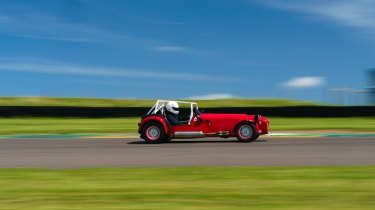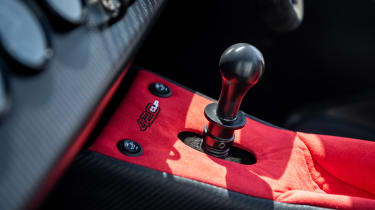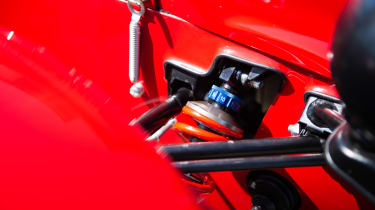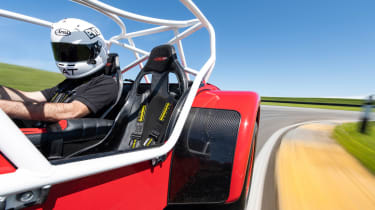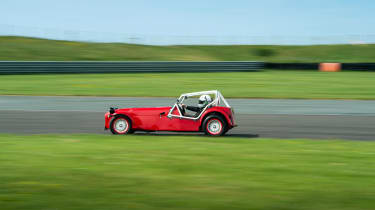Caterham 420 Cup 2022 review – pure driving pleasure
Caterham’s latest concoction is more exciting, invigorating and intense than ever. Long live the mighty Seven
It’s not easy to select the most aggressive, performance-focussed mode for the new Caterham 420 Cup. Hop over the sill and stand on the seat, thread your legs down towards the pedals as you shuffle and squeeze into the skinny seat, buckle the four-point harness, then grab the steering wheel, pull back the retaining clip on its underside and then press the assembly and wiggle it until you feel the teeth align with those on the column. Now you’re ready, locked in place and the tiny little steering wheel is secure, too.
The physical ritual is unusual compared to ‘normal’ cars but once it’s completed the hard stuff is over. Just press the starter button and the 420 Cup is primed and ready. No touch screens. No menu systems. No manettino. No traction control to adjust or remove. The moment you’re strapped in every decision that counts has already been made. You’re here to drive and the 420 Cup is complicit. Just don’t expect it to do any more than its fair share. Drive well and it’ll make you feel like a superhero. Drive clumsily, or just with the abandon you might in most modern performance cars and you’ll soon be sitting in a gravel trap.
The 420 Cup is Caterham’s new hardcore trackday machine, a £55,000 bundle of fury. Now, you might think any Seven is a pretty hardcore trackday car but the 420 Cup takes things further still. It’s based on the Seven Championship UK 420R – Caterham’s fastest racecar – and features a 2-litre Duratec engine, 6-speed sequential gearbox and extreme Avon ZZR tyres. Power actually takes a step up from the racecar from 175bhp to 210bhp (the same as the standard 420R road car) and the 420 Cup gains fully-adjustable Bilstein dampers whereas the racecar makes do with fixed-rate items.
More reviews
There are plenty of other details – race style nose cone, central fuel filler, carbon fibre seats and dash, optional full roll cage (including metal boot cover and racing mirrors if you really want the full racecar aesthetic) and lots of neat detailing inside and out that feels a step-up from Caterhams of old. However, now as always, it’s what the Seven does rather than some fancy graphics or dials that really count. What matters is that you have a crackling normally-aspirated engine, an outrageously fast Sadev sequential gearbox, four sticky tyres and just 578kg to fling around. The 420 Cup is available in wide body or standard chassis sizes and offered in the UK and US markets.
Our time in the 420 Cup is track only and the Bilstein dampers are set to mimic those of the racecar (bump and rebound are adjusted together and dampers have 10 clicks to cycle through. We’re on 8 all around). Later we’ll get to tinker with the settings but for now it’s just a matter of jumping in, rolling out of the pitlane and getting stuck in. Immediately the 420 Cup feels completely intuitive, wickedly precise and the whole car is so energised. Every input is met with an instant reaction and although the car requires physical effort there’s lightness that’s palpable in everything this car does. If you think a Cayman GT4 feels agile, or a McLaren 765LT or Mazda MX-5, then prepare for a shock. The 420 Cup is like an extension of your thought processes.
Yet whilst the 420 Cup compresses time between input and reaction, there’s no question that it also demands concentration and a bit of muscle to master. The steering is loaded with information, which is supplemented by the fact you can watch the front wheels turning, but it’s relatively heavy and loads-up still further in long corners as the lateral forces build. The stubby gearlever for the sequential ‘box demands assertive action as you punch in downshifts or tug back for upshifts. No need to lift, just wait for those shift lights to blink and pull as hard as you dare. The torque interruption is minimal and whilst something of the skill of a perfect H-pattern shift is lost, the intensity of the experience is something to savour and adds a really authentic racecar feel.
Plus, you’re so immersed in everything else – carrying enough speed to really challenge the super-grippy tyres; working the brakes hard but not just slamming the pedal and locking wheels; unleashing every scrap of power and manipulating this little car’s balance with minute precision – that you never want for ‘involvement’. The 420 Cup is always bombarding sensations and information. It’s a challenge, too. Not because it’s difficult to control at the limit. In fact, it’s wonderfully easy to manage and has a lovely natural tendency towards a hint of oversteer. Rather it’s just that the limit seems almost elastic. There’s so much grip and then, even when you think you’re pushing really hard, you discover the 420 Cup has more to give. Nailing a perfect lap would require precision, skill and bravery in equal measure, which is surely the way it should be?
The wider chassis model offers a slightly calmer experience. It’s still fantastically agile by any normal standards but somehow it feels a little more conventional than the standard 420 Cup and doesn’t fizz with the same energy nor demand the constant management to dance on the edge. Our advice is to do everything you can to squeeze into the standard car. It’s worth the temporary pain. The 420 Cup really is a dazzlingly good car and feels like a genuine step-on from the already superb 420R. More grip, more adaptability thanks to those adjustable dampers, a greater intensity created by the superb sequential gearbox and the same endlessly entertaining balance.
Price and rivals
The 420 Cup costs from £55,000. Not cheap by any stretch of the imagination. Yet in a world where people are paying those sorts of numbers over list price for something like a Porsche Cayman GT4 RS, Caterham’s fierce trackday car seems like a genuine bargain. Use it as intended and the massive advantage over other ‘trackday’ cars of similar performance but a more conventional size and shape are amplified. The wear rate and cost of replacement consumables is a fraction that of, say, a GT3 or even something like a BMW M2 CS or Civic Type R.
Of course, the Seven is not an all-rounder and isn’t even a little bit practical. If you need a car to do everything this isn’t it. Yet the timeless appeal of the Seven formula is only growing as normal cars get heavier and even more complex. With the Elise out of production and cars like the Atom 4 and BAC Mono at a much higher price point, the 420 Cup finds itself in a niche all of its own. Fitting really, as nothing quite offers a driving experience like a high-power, stripped bare and wrung-out Caterham Seven.

